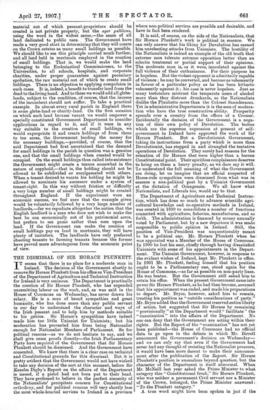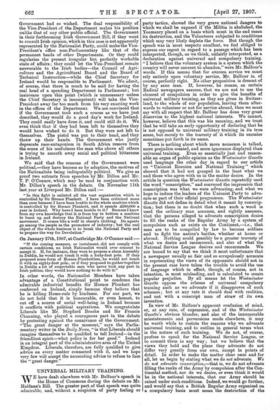THE DISMISSAL OF SIR HORACE PLUNKETT.
IT seems that there is no place for a moderate man in Ireland. The decision of the Government shortly to remove Sir Horace Plunkett from his office as Vice-President of the Department of Agriculture and Technical Instruction for Ireland is very ominous. The Department is practically the creation of Sir Horace Plunkett, who has expended unremitting labour on the work, and, as was said in the House of Commons on Wednesday, has never drawn his salary. He is a man of broad sympathies and great humanity, who has done more than any public servant in our day to understand the character and ways of the Irish peasant and to help him by methods suitable to his genius. Sir Horace 's sympathies have indeed made him too little Unionist for Unionists ; but his moderation has prevented him from being Nationalist enough for Nationalist Members of Parliament. So for political reasons—as we do not hesitate to say, and we shall give some proofs directly—the Irish Parliamentary Party have required of the Government that Sir Horace Plunkett should be dismissed. • And the Government have consented. We know that there is a clear case on technical and Constitutional grounds for this dismissal. But it is pretty evident that the Government would not have wished to take any decision of the sort at this moment, before Sir Kenelm Digby's Report on the affairs of the Department is issued, if a pistol had not been put to their head. They have professed to believe in the perfect sincerity of the Nationalists' precipitate concern for Constitutional orthodoxy, and for political reasons will very shortly lose the moat whole-hearted services to Ireland in a province
where non-political services are possible and desirable, and have in fact been rendered.
It is said, of course, on the side of the Nationalists, that Sir Horace Plunkett's work is political in essence. We can only answer that his liking for Devolution has earned him unrelenting attacks from Unionists. The hostility of the Nationalists is indeed an example of the old truth that extreme men tolerate extreme opposition better than an eclectic treatment or partial support of their opinions. The moderate man is, as it were, inoculated against the full violence of their enthusiasms. For their purpose he is hopeless. But the violent opponent is admittedly capable of violence ; he may be converted, and become as vehemently in favour of a particular policy as he has been hitherto.
i
vehemently against it ; his case is never hopeless. Just as many teetotalers mistrust the temperate users of alcohol more than they distrust drunkards, so the Nationalists dislike the Pluuketts more than the Colonel Saundersons. Yet in administrative Departments it is the men of modera- tion who have the true constructive ability. Prosperity spreads over a country from the offices of a Cromer. Incidentally the decision of the Government is a nega- tion of their own policy of Devolution. The bodies which are the supreme expression at present of self- government in Ireland have approved the work of Sir' Horace Plunkett. But a Devolutionist Government, taking its instructions from a party which is more than Devolutionist, has stepped in and strangled the tentative operations of Devolution. They surely had reasons for the retention of Sir Horace that were higher than a barren Constitutional point. Their spiritless complaisance deserves to bring on them a heavy penalty, as we dare say it will. To understand the full meaning of what the Government are doing, let us imagine that an official suspected of Home-rule sympathies were dismissed from what was in essence a non-political post by a Unionist Government at the dictation of Orangemen. We all know what Nationalists, and Liberals too, would say to that.
The Department of Agriculture and Technical Instruc- tion, which has done so much to advance scientific agri- cultural knowledge and co-operative methods in Ireland, was created in 1899 to consolidate a number of functions connected with agriculture, fisheries, manufactures, and so foith. The administration is financed by money annually voted by Parliament, but by a new departure it was made responsible to public opinion in Ireland. Still, the position of Vice-President was unquestionably meant' to be a political one. Mr. Horace Plunkett when he was appointed was a Member of the House of Commons. In 1900 he lost his seat, chiefly through having dissatisfied Unionists with some of his appointments in the Depart- ment. The Unionist Government, however, in response to the evident wishes of Ireland, kept Mr. Plunkett in office. In 1901 Mr. Plunkett, feeling himself that his position ought to be a Parliamentary one, stood again for the House of Commons,—as far as possible on non-party lines. He was beaten. But the Government still asked him to retain his office. When the present Government came into power Sir Horace Plunkett, as he had then become, assumed that his appointment was ended, and made his preparations to depart. Mr. Bryce, however, asked him to remain, treating his position as "outside considerations of party." Mr. Bryce added that the Government reserved entire liberty of action, but suggested that Sir Horace by remaining " provisionally "at the Department would" facilitate " the " examination " into the affairs of the Department. No one can deny that the Government are acting within their rights. But the Report of the " examination " has not yet, been published—the House of Commons had no official data to go upon in the debate in which Mr. Birrell announced the Government's decision on Wednesday— and we can only say that even if the Government had never had any thought of resisting the Nationalist pressure, it would have been more decent to make their announce- ment after the publication of the Report. Sir Horace Plunkett's position is anomalous beyond question, but the character of the Department is itself abnormal. When Mr. McNeill last year asked the Prime Minister to what category this " Constitutional freak," Sir Horace Plunkett, who was neither a permanent Civil servant nor a Minister of the Crown, belonged,, the Prime Minister answered : " To the Plunkett category."
A true word might have been spoken in jest if the Government bad so wished. The dual responsibility of the Vice-President of the Department makes his position unlike that of any other public official. The Government in their forthcoming Irish Government Bill, if they want to consult Irish opinion, which in this case is not apparently represented by the Nationalist Party, could make the Vice- President's office non-Parliamentary like that of the permanent heads of other Departments. Or they could regularise the present irregular but perfectly workable state of affairs ; they could let the Vice-President remain answerable to the Irish bodies—the Council of Agri- culture and the Agricultural Board and the Board of Technical Instruction—while the Chief Secretary for Ireland would be responsible to Parliament. We admit, of course, that there is much to be said for having the real head of a spending Department in Parliament; but insistence upon this point (which is unnecessary unless the Chief Secretary is incompetent) will take the Vice- President away far too much from his very exacting work in the offices of the Department. We are convinced that if the Government took such a course as we have just described, they would do a good day's work for Ireland. They could easily have done it, and could still do it. We even think that if they had been left to themselves they would have wished to do it. But they were not left to themselves. The pistol was put to their head, and they threw up their hands. The Government who justly deprecate race-antagonism in South Africa remove from the scene of his usefulness the man who above all others is trying to smooth away social and political bitterness in Ireland.
We said that the reasons of the Government were political,—they have become so by adoption, the motives of the Nationalists being indisputably political. We give as proof two extracts from speeches by Mr. Dillon and Mr. T. P. O'Connor, which may be read in conjunction with Mr. Dillon's speech in the debate. On November 11th last year at Liverpool Mr. Dillon said :—
"In this fight is enlisted all the vast organisation which is controlled by Sir Horace Plunkett. I have been criticised more than once because I have been hostile to the whole machine which is controlled by Sir Horace Plunkett, and it spends 2280,000 a year in Ireland. Why have I been hostile to it P Because I know from my own knowledge that it is from top to bottom a machine to burst up and destroy the National Party and the National movement. It comes like a wolf in sheep's clothing. Its agents go among the people as the promoters of industry ; but the real object of the whole business is to break the National Party and to prepare the way for Devolution."
On January 27th, 1907, at Coatbridge Mr. O'Connor said :— "If the coming measure, or instalment, did not Comply with certain conditions, no Irish Nationalist would ever consent to accept it. If, for instance, they were to propose a sham Assembly in Dublin, he would not touch it with a forty-foot pole. If they proposed some form of Horace-Plunkettism, he would not touch it with an eighty-foot pole; or if they proposed to gather together in Dublin a lot of respectable men who never took any part in Irish politics, they would have nothing to do with it."
In other words, the Nationalist Members have taken advantage of a Constitutional point to condemn the admirable industrial benefits Sir Horace Plunkett has conferred on Ireland, simply because they believe that he is killing Home-rule by kindness. For our part, we do not hold that it is honourable, or even honest, to cut off a source of social well-being in Ireland because it conflicts with political aspirations. We congratulate Liberals like Mr. Stopford Brooke and Sir Francis Channing, who played a courageous part in the debate by protesting against the connivance of the Government. "The great danger at the moment," says the Parlia- mentary writer in the Daily News," is that Liberals should imagine themselves to be qualified to tell Ireland—in the friendliest spirit—what policy is for her good." Ireland is an integral part of the administrative area of the United Kingdom. Liberals, therefore, are fully qualified to give advice on every matter connected with it, and we hope very few will accept the nauseating advice to refuse to face the " great danger."



























































 Previous page
Previous page